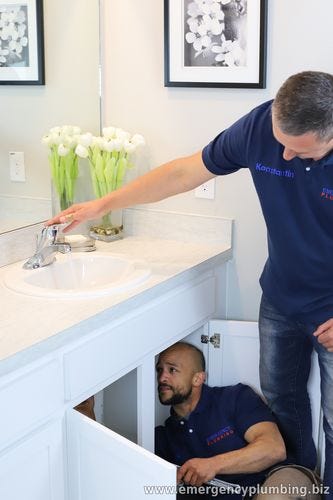Handy Bathroom Plumbing Guidelines for New Homeowners
Handy Bathroom Plumbing Guidelines for New Homeowners
Blog Article
Right here in the next paragraphs you will find a lot of exceptional ideas in regards to Smart Plumbing Tips for New Homeowners.

For brand-new home owners, understanding and preserving washroom plumbing can conserve both time and money by protecting against pricey problems down the line. Right here are some important shower room plumbing pointers to aid you maintain every little thing running efficiently.
Get Ready For Winter
Shield your pipelines from cold throughout winter by insulating pipes in unheated locations like basements, attic rooms, and garages. Throughout severe chilly, let cold water drip from faucets offered by subjected pipes to help avoid freezing.
Arrange Routine Maintenance
Consider organizing annual inspections with a qualified plumber. They can find problems that you might miss, such as surprise leaks or deterioration on pipelines and components. Routine upkeep helps prolong the life of your plumbing system and can avoid emergencies.
Familiarize Yourself with the Key Shut-Off Valve
Recognizing where the primary water shut-off shutoff is located in your house is important. This permits you to quickly shut off the water system in case of major leakages or throughout pipes emergencies, protecting against extensive water damage.
Routinely Evaluate for Leakages
Tiny leakages can cause huge issues. Regularly check under sinks, around toilets, and near plumbing components for any type of indicators of leaks. Seek wetness, little drips, or corrosion. Capturing and repairing leakages early can avoid extra significant damage and save water.
Keep Your Water Heater
Guarantee your water heater is readied to an appropriate temperature (commonly about 120 degrees Fahrenheit) to stop hot and reduce energy use. Flush the container each year to remove sediment accumulation, which can minimize the effectiveness and life expectancy of your heater.
Upgrade Your Components
If your home has older components, consider upgrading to much more reliable versions. Modern commodes, showerheads, and taps are created to make use of much less water while providing great pressure, which can dramatically lower your water costs and environmental impact.
Beware with DIY Pipes Repairs
While it's alluring to handle all home repairs on your own, beware with plumbing. Some issues may need professional competence, especially if they entail main water lines or sewage system repair work. Working with an expert can occasionally be much more cost-effective than do it yourself, specifically if it prevents additional damages.
Do Not Overlook Slow Drains Pipes
If your sink or bathtub is draining pipes gradually, it's commonly a sign of a clog creating. Resolving this early can prevent a total clog. Make use of a bettor or a plumbing professional's snake to clean out particles. Stay clear of using chemical drain cleaners as they can harm your pipes gradually.
Know What Not to Flush
Toilets are not waste disposal unit. Prevent purging anything apart from bathroom tissue and human waste. Things like wipes, womanly hygiene items, and cotton bud should be thrown away in the trash to prevent obstructions and drain backups.
Mount Strainers in Drains
Place strainers in your sink and bath tub drains to catch hair and other particles before they enter your plumbing system. Cleaning up the strainers consistently will aid prevent build-up and maintain water streaming easily.
Verdict
Comprehending and keeping your home's restroom plumbing can prevent numerous common concerns. By following these essential tips, you can ensure your shower room continues to be functional and effective, saving you time and money in the future.
Essential Plumbing Tips for Homeowners: Keep Your Pipes Flowing Smoothly
As a homeowner, understanding the basics of your plumbing system can save you time, money, and a lot of headaches. Plumbing issues can range from minor annoyances like dripping faucets to major problems like burst pipes that cause significant damage. This guide provides essential tips to help you maintain your plumbing system and tackle common issues.
Understanding Your Plumbing System
Supply System: Brings fresh water into your home from a municipal source or a well. Drain-Waste-Vent System: Removes wastewater and vents sewer gases outside. Fixtures and Appliances: Includes sinks, toilets, showers, dishwashers, and washing machines. Basic Maintenance Tips
Regular Inspections: Periodically check for leaks, corrosion, and other signs of wear and tear. Look under sinks, around toilets, and near water heaters. Know Your Main Shut-Off Valve: In case of a major leak, you’ll need to shut off the water quickly. Ensure everyone in your household knows where the main shut-off valve is located. Prevent Frozen Pipes: In cold climates, insulate exposed pipes and let faucets drip during extreme cold to prevent freezing. Use Strainers: Install strainers in sinks and tubs to catch hair, food particles, and other debris that can cause clogs. Common Plumbing Issues and Solutions
Clogged Drains:
Prevention: Avoid pouring grease down the drain and use drain screens to catch debris. DIY Fix: Use a plunger or a plumbing snake to clear minor clogs. For stubborn clogs, a mixture of baking soda and vinegar can sometimes help. Leaky Faucets:
Prevention: Replace washers and seals regularly. DIY Fix: Turn off the water supply, disassemble the faucet, and replace worn parts.

Give Me A Quote! Report this page